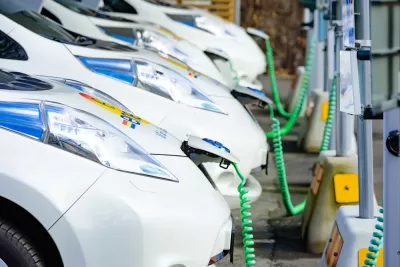Germany has approved legislation calling for the end of the end of internal combustion engine by 2030. Whether the rest of Europe follows Germany's lead is to be determined.

"Germany’s Spiegel Magazin [German] reported this morning that the country’s top legislative body was able to reach a bi-partisan agreement that hopes to allow only zero-emission vehicles on EU roads in 14 years," according to an article by Rhett Jones.
Betel Schmitt also picks up on the news for Forbes, focusing on the likelihood that the German regulations could be adopted in the remainder of the European Union. "On its own, the resolution has no legislative effect. EU type approval is regulated on the EU level. However, German regulations traditionally have shaped EU and UNECE regulations," writes Schmitt.
Schmitt also reports that the resolution "calls on the EU Commission to 'review the current practices of taxation and dues with regard to a stimulation of emission-free mobility.'" Any taxation that could arise as a result of this review, could further hasten the demise of the internal combustion engine.
FULL STORY: Germany's Bundesrat Resolves End Of Internal Combustion Engine

Trump Administration Could Effectively End Housing Voucher Program
Federal officials are eyeing major cuts to the Section 8 program that helps millions of low-income households pay rent.

Planetizen Federal Action Tracker
A weekly monitor of how Trump’s orders and actions are impacting planners and planning in America.

Ken Jennings Launches Transit Web Series
The Jeopardy champ wants you to ride public transit.

Driving Equity and Clean Air: California Invests in Greener School Transportation
California has awarded $500 million to fund 1,000 zero-emission school buses and chargers for educational agencies as part of its effort to reduce pollution, improve student health, and accelerate the transition to clean transportation.

Congress Moves to End Reconnecting Communities and Related Grants
The House Transportation and Infrastructure Committee moved to rescind funding for the Neighborhood Equity and Access program, which funds highway removals, freeway caps, transit projects, pedestrian infrastructure, and more.

From Throughway to Public Space: Taking Back the American Street
How the Covid-19 pandemic taught us new ways to reclaim city streets from cars.
Urban Design for Planners 1: Software Tools
This six-course series explores essential urban design concepts using open source software and equips planners with the tools they need to participate fully in the urban design process.
Planning for Universal Design
Learn the tools for implementing Universal Design in planning regulations.
Heyer Gruel & Associates PA
Ada County Highway District
Institute for Housing and Urban Development Studies (IHS)
City of Grandview
Harvard GSD Executive Education
Toledo-Lucas County Plan Commissions
Salt Lake City
NYU Wagner Graduate School of Public Service




























